Scottish independence: The currency debate, claim by claim
- Published
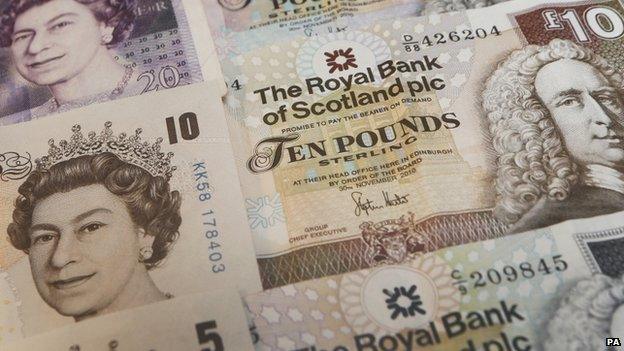
Currency in an independent Scotland has become the central issue of the referendum debate
The issue of what currency an independent Scotland would use has become the key battleground of the referendum debate.
The Scottish government is in favour of a sterling zone, saying it would be in the interests of both Scotland and the UK to continue to formally share the pound if the former votes for independence, ensuring stability for both states.
UK chancellor George Osborne has said the UK would not enter into a currency union with Scotland if it voted 'Yes' in September's referendum, claiming such a union would be against the economic interests of England, Wales and Northern Ireland.
Mr Osborne's statement was the UK government's strongest intervention in the debate yet, and his position was supported by both Labour and the Liberal Democrats.
First Minister Alex Salmond countered Mr Osborne's claims in a speech to pro-independence business leaders in Aberdeen on Monday, which he said had "deconstructed" the case against a currency union.
So what are Mr Osborne's key arguments and how has Mr Salmond sought to counter them?
Claim: Trade with Scotland is important to the UK, but the overall proportion is small
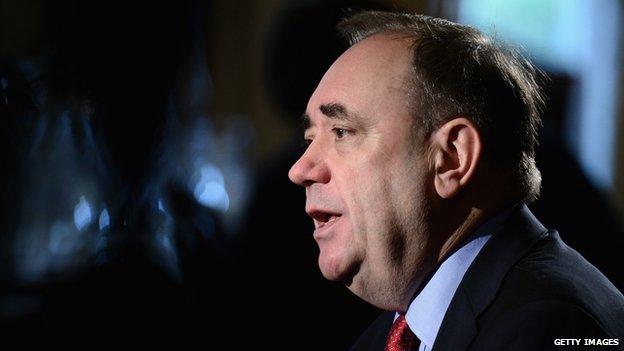
Alex Salmond defended a currency union between an independent Scotland and the rest of the UK during a speech to business leaders in Aberdeen
George Osborne: "I'm the first to say that our deeply integrated businesses and their suppliers are compelling reasons for keeping the UK together - 70% of Scottish trade is with the rest of the UK. That is a massive proportion.
"And trade with Scotland is important to the rest of the UK - but at only 10% of the total trade, it is a much smaller proportion. These trade figures don't make the unanswerable case for a shared currency that the Scottish government assume."
Alex Salmond: "I am publishing an estimate of the transactions costs, external he would potentially impose on businesses in the rest of the UK. They run to many hundreds of millions of pounds. My submission is that this charge - let us call it the George tax - would be impossible to sell to English business.
"In fact if you remove oil and gas from the equation, Scotland is one of the very few countries in the world with which England has a balance of trade surplus."
Claim: An independent Scotland would be a foreign country

In a speech opposing a currency union between Scotland and the rest of the UK, George Osborne said an independent Scotland would be a foreign country
George Osborne: "When the nationalists say 'the pound is as much ours as the rest of the UK's', are they really saying that an independent Scotland could insist that taxpayers in a nation it has just voted to leave had to continue to back the currency of this new foreign country . . . consider the circumstances of this foreign country when setting their interest rates, stand behind the banks of this foreign country as a lender of last resort or stand behind its foreign government when it needed public spending support.
"That is patently absurd."
Alex Salmond: "For Scots, whether independent or not, the rest of the UK will never be 'foreign'. Indeed the Government of Ireland Act of 1948, negotiated after infinitely more difficult circumstances than we have, specifically states that Ireland is not to be regarded as a 'foreign country'.
"And so despite the Chancellor's campaign rhetoric I don't believe his 'foreigner' language represents any significant view in Scotland or indeed England, Wales and Northern Ireland.
Claim: The pound belongs to the UK
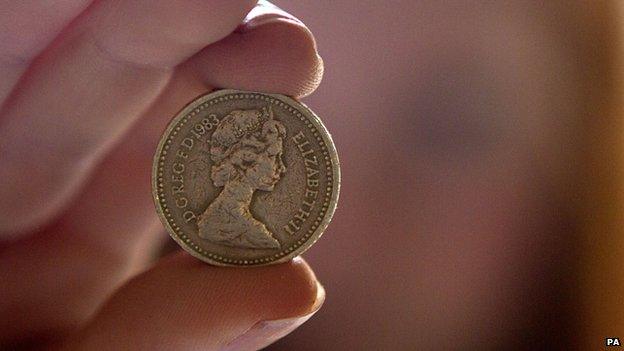
Scotland would walk away from the pound if it leaves the Union, according to chancellor George Osborne
George Osborne: "There's no legal reason why the rest of the UK would need to share its currency with Scotland, as the Treasury's publication clearly shows. If Scotland walks away from the UK, it walks away from the UK pound.
An accompanying Treasury paper, external said there was no legal basis for Scotland to assert a "share" of the pound or the Bank of England, because the UK would be the "continuing state" in international law.
Alex Salmond: "If there is no legal basis for Scotland having a share of the public assets of the Bank of England, then there is equally no legal basis for Scotland accepting a share of the public liability of the national debt.
"As Professor Christine Bell of Edinburgh University wrote, legally under international law the position is clear: if the remainder UK keeps the name and status of the UK under international law, it keeps its liabilities for the debt. The UK took out the debt, and legally it owes the money. Scotland cannot therefore 'default'.
"We are willing, despite the legal position, to accept a share of liabilities on the basis that there is also a share of the assets - one of which is the Bank of England which holds almost one third of the UK debt."
Claim: Scotland's financial sector is too big for a workable currency union
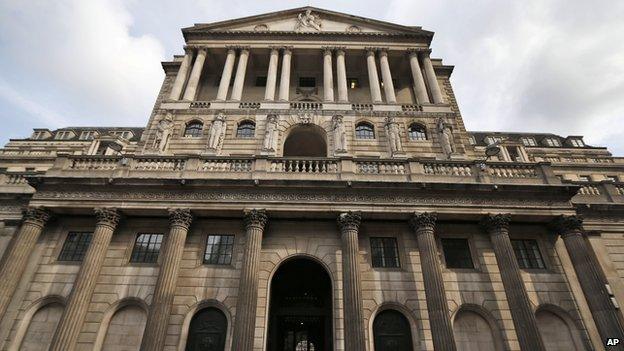
The Bank of England is a joint UK asset, according to First Minister Alex Salmond
George Osborne: "The rest of the UK would be tying its currency to a country with a big financial sector, capable of inflicting huge damage on it."
An accompanying treasury paper, external estimated Scotland's financial sector was 25% of the UK's total.
Alex Salmond: "HMRC estimated Scotland's share of the Bank Levy (effectively a charge on the balance sheets of banks) to be 7.3% of the UK total - smaller than Scotland's share of UK GDP - not the near 25% which the Treasury has estimated and on which the Chancellor's remarks are based.
"This Treasury achieved its inflation of the Scottish financial sector by simply allocating London based assets to Scotland."
Claim: A currency union means the rest of the UK would have to bail Scotland out during difficult times, such as oil market volatility
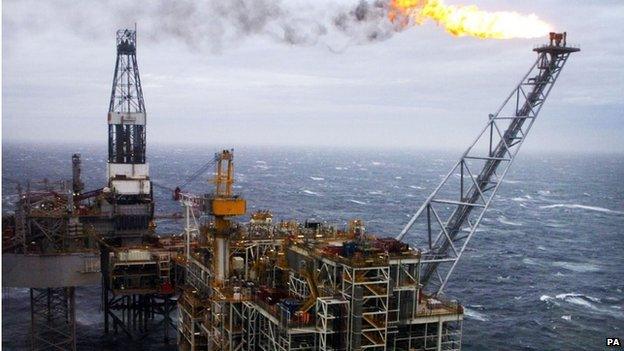
The chancellor said a currency union could be put at risk by volatility in the oil markets
George Osborne: "The continuing UK would be almost 10 times the size of the Scottish economy, so this would be a totally one-sided deal where UK taxpayers would have to transfer money to an independent Scotland in times of economic stress with limited prospect of any transfers the other way.
"Consider for example the impact of a substantial fall in the oil price - something we've seen several times over the last 30 years. As part of the UK, Scotland is insulated from the impacts that this would have on tax revenues."
Alex Salmond: "They would not. In fact, the Fiscal Commission Working Group recommended a stabilisation fund to address this very point. The fund would mean money will be built up when the oil price is high to smooth out price fluctuations if the oil price was low.
"The Chancellor cited between 2008 and 2009 when oil prices fell as his example. In fact in both years with oil prices low and oil prices high Scotland's finances were healthier than the UK - in 2008-09 by a lot and in 2009-10 by a little.
Claim 6: Scotland would have to cede sovereignty to join a currency union with the UK

The parliament of an independent Scotland would have to cede some sovereignty in the event of a currency union
George Osborne: "Look at the direction the euro is heading in - supervision and consent to member budgets, deficit controls, debt reduction rules.
"In a crucial sense, Scotland would have less independence than it has now - because spending and tax decisions would still have to be agreed by the parliament in Westminster, but now there would be no longer any Scottish MPs in that parliament or Scottish members of the cabinet.
"And the citizens of the rest of the UK would have to concede at least some sovereignty and supervision of our own budget to a foreign country - something we've fiercely resisted up to now and would in the future."
Alex Salmond: The Fiscal Commission did recommend a fiscal sustainability agreement with overall objectives for ensuring that net debt and government borrowing do not diverge significantly.
"These would be sensible rules that any country, whether in or out of a currency union, would seek to adhere to. Such an agreement would allow control over fiscal levers, employment policy, competition policy and a range of other policies which would in turn boost economic resilience."